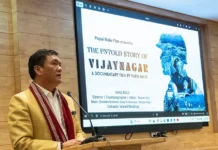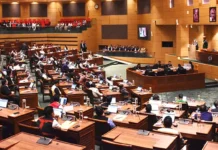[ Pisi Zauing ]
Assam, Tripura, Meghalaya and two districts of Arunachal to be affected by Citizenship (Amendment) Bill, 2016
The central government plans to change the definition of illegal migrants with the Citizenship (Amendment) Bill, 2016. The Bill, introduced in the Lok Sabha on July 15, 2016, seeks to amend the Citizenship Act, 1955 to provide citizenship to illegal migrants, from Afghanistan, Bangladesh and Pakistan, who are of Hindu, Sikh, Buddhist, Jain, Parsi or Christian extraction.
However, the Act doesnot have a provision for Muslim sects like Shias and Ahmediyas who also face persecution in Pakistan. The Bill also seeks to reduce the requirement of 11 years of continuous stay in the country to six years to obtain citizenship by naturalisation.
According to the Citizenship Act, 1955, an illegal immigrant is one who enters India without a valid passport or with forged documents, or a person, who stays beyond the visa permit. But the BJP wants to amend the original bill and give citizenship on the basis of religion.
The BJP had promised to grant citizenship to Hindus persecuted in the neighbouring countries during the 2014 general election. In the party’s election manifesto, the BJP had promised to welcome Hindu refugees and give shelter to them.
The Bill, if made into an Act, will work against the cultural and linguistic identity of the indigenous people and nullify the updated National Registration of Citizenship (NRC) in Assam. While the Bill is designed to grant citizenship to non-Muslim refugees persecuted in neighbouring countries, NRC does not distinguish migrants on the basis of religion. It will consider deporting anyone who has entered the state illegally post-March 24, 1971, irrespective of their religion. But if the Bill becomes an Act, the non-Muslims in Assam need not go through any such process, which means this will be clearly discriminating against Muslims identified as undocumented immigrants.
Other than Assam, states like Tripura and Meghalaya bordering Bangladesh and two districts of Eastern Arunachal bordering Assam, namely Changlang and Namsai will be largely affected by the Citizenship (Amendment) Bill, 2016, if it is passed. Other than northeast, the states sharing borders with Bangladesh and Pakistan are also likely to be affected.
Since the bill is dangerous, the idea of non-Muslims acquiring citizenship after six years of living in the country cannot be endorsed.
The indigenous people of Assam, Meghalaya, Tripura and eastern part of Arunachal Pradesh (Changlang and Namsai districts) are in deep anxiety since the day of introduction of the bill in the Lok Sabha.
These NE states that have been carrying the burden of migrants since the last six decades are too small in comparison to the northern, southern and mainland states. There are genuine apprehensions that if the Bill is made into an Act, the indigenous streams of people of these states would be reduced to minority in their own home state.
These states are overburdened and can no longer sustain any more burden of influx of people from any foreign soil. The indigenous people are almost in a minority status and passing of the Bill would surely reduce them to minority. Hence, the said Bill needs to be withdrawn at once as it is “ex-facto retrovirus” of the Constitution of India.
India is a secular country and by 42nd Amendment of its Constitution, the word ‘Secular’ is made part of the preamble reflecting the collective will of the people. It is noteworthy that scores of court judgments, for instance, had held that the “basic structure of the Constitution is not within the amending power of the Parliament”.
There appear no provisions in the Citizenship Act, 1955, to grant citizenship on the basis of religion and all the Acts are subservient to the Constitution. Hence, the Parliament does not have the right to amend the Constitution to grant citizenship on the basis of religion, as it might change the basic structure of the Constitution of the country.
Moreover, the State Reorganisation Commission, 1956, had suggested formation of states on the basis of language alone. On this count, the proposed Citizenship Act, 1955 (Amendment Bill), 2016 is liable to be withdrawn forthwith.
In view of this fact, if the proposed Bill is made into an Act, it might deal a deadly blow to the very concept of State Reorganisation Commission and the indigenous people shall be minority in their own home State.
Amendment to the Citizenship Act, 1955, allowing further infiltration of people from Bangladesh, Pakistan and other countries shall endanger the existence and identity of indigenous people and they shall be reduced to linguistic minority in their own home State. The proposed legislation is not reasonable in any way and will go against national integrity, peace and tranquility.7
The apex court in Sarbananda Sonowal VS Union of India (2005) 5 SCC 655 case compared illegal migration with external aggression. While making an observation, the apex court never distinguished them on the basis of religion. But unfortunately, the present government at the Centre, instead of protecting the indigenous people from external aggression wants to honour them by conferring citizenship.




